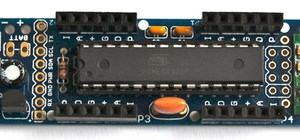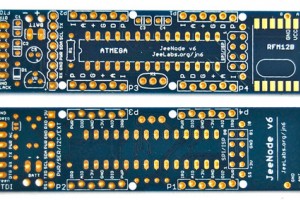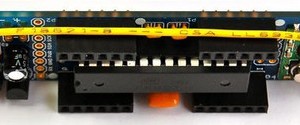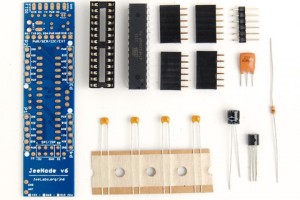The JeeNode is a compact wireless board with an Atmel 8-bit RISC microprocessor. JeeNodes are compatible with the Arduino platform and can be programmed under Windows, Mac OS X, or Linux using sketches created with the Arduino IDE.
Each JeeNode has 4 identical “ports” for attaching analog and digital I/O logic, I2C devices, and more. The JeeLib library makes it easy to interface to these ports.
The JeeNode Kit contains all the parts needed to build a JeeNode v6 – including an ATmega328p processor and an RFM12B radio module. The processor chip is pre-flashed with the Arduino boot loader and the RF12demo sketch.
Kits include the ISM-band 868 MHz radio module as used in Europe. See the Modern Device shop for 915 MHz JeeNodes and US$ prices.
The NoRF variant is a kit without the RFM12B radio module. It’s essentially a low-cost Arduino-compatible board with four ports.
The PCB only variant is the bare v6 board without any components. You’ll need to add your own ATmega, RFM12B, regulator, pin headers, and a few other components to create a working JeeNode.
Need a lot? There are economical 6-packs and 10-packs - 10 for less than the price of 9!
The documentation and full design details are freely available. For an overview and comparison with Arduino, see this write-up.
Note: You'll also need a USB-to-serial connection, such as the USB BUB, to upload sketches.
As of mid-Jan 2012, JeeNodes ship with OptiBoot 4.4, which is compatible with Uno boards (the previous bootstrap was for Duemilanove's). The power feed diode became optional in V6 and is no longer needed or included.
Each JeeNode has 4 identical “ports” for attaching analog and digital I/O logic, I2C devices, and more. The JeeLib library makes it easy to interface to these ports.
The JeeNode Kit contains all the parts needed to build a JeeNode v6 – including an ATmega328p processor and an RFM12B radio module. The processor chip is pre-flashed with the Arduino boot loader and the RF12demo sketch.
Kits include the ISM-band 868 MHz radio module as used in Europe. See the Modern Device shop for 915 MHz JeeNodes and US$ prices.
The NoRF variant is a kit without the RFM12B radio module. It’s essentially a low-cost Arduino-compatible board with four ports.
The PCB only variant is the bare v6 board without any components. You’ll need to add your own ATmega, RFM12B, regulator, pin headers, and a few other components to create a working JeeNode.
Need a lot? There are economical 6-packs and 10-packs - 10 for less than the price of 9!
The documentation and full design details are freely available. For an overview and comparison with Arduino, see this write-up.
Note: You'll also need a USB-to-serial connection, such as the USB BUB, to upload sketches.
As of mid-Jan 2012, JeeNodes ship with OptiBoot 4.4, which is compatible with Uno boards (the previous bootstrap was for Duemilanove's). The power feed diode became optional in V6 and is no longer needed or included.
No projects use this part yet.
| Supplier | Prices | Link |
|---|---|---|
| JeeLabs Shop |
from 1: 18.500€ from 6: 16.500€ from 10: 15.900€ |
open |
Attributes
| Eingangsspannung (limit): | 3,5-13V | |
| Mikrocontroller: | ATmega328p | |
| Taktfrequenz: | 16MHz |
Info
| Best Price | 18.5 € | ||
| Best Bulk Price | 15.9 € | ||
| Friends Stock | 0 | ||
| Overall Stock | 0 | ||
| Login to add to stock | |||
| 0 Projects use this part. | |||
| Created: | 2013-07-20 09:46:29 | ||
| Last Update: | 2013-10-20 09:33:16 | ||



